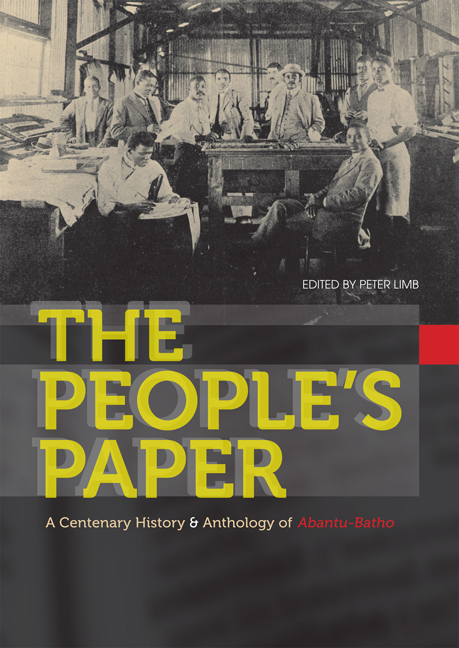Book contents
- Frontmatter
- Contents
- Contributors
- Acknowledgements
- Preface
- List of Abbreviations and Acronyms
- List of Illustrations
- PART I Essays
- Overview
- FOUNDERS AND EDITORS
- THEMES AND CONNECTIONS
- Chapter 6 The Swazi Royalty and the Founding of Abantu-Batho in a Regional Context
- Chapter 7 Abantu-Batho and the Xhosa Poets
- Chapter 8 African Royalty, Popular History and Abantu-Batho
- Chapter 9 ‘Johannesburg in Flames’: The 1918 Shilling Campaign, Abantu-Batho and Early African Nationalism in South Africa
- Chapter 10 Garveyism, Abantu-Batho and the Radicalisation of the African National Congress during the 1920s
- Chapter 11 An African Newspaper in Central Johannesburg: The Journalistic and Associational Context of Abantu-Batho
- Conclusion: Assessing the Decline and Legacy of Abantu-Batho
- PART II Anthology
Chapter 10 - Garveyism, Abantu-Batho and the Radicalisation of the African National Congress during the 1920s
from THEMES AND CONNECTIONS
Published online by Cambridge University Press: 21 April 2018
- Frontmatter
- Contents
- Contributors
- Acknowledgements
- Preface
- List of Abbreviations and Acronyms
- List of Illustrations
- PART I Essays
- Overview
- FOUNDERS AND EDITORS
- THEMES AND CONNECTIONS
- Chapter 6 The Swazi Royalty and the Founding of Abantu-Batho in a Regional Context
- Chapter 7 Abantu-Batho and the Xhosa Poets
- Chapter 8 African Royalty, Popular History and Abantu-Batho
- Chapter 9 ‘Johannesburg in Flames’: The 1918 Shilling Campaign, Abantu-Batho and Early African Nationalism in South Africa
- Chapter 10 Garveyism, Abantu-Batho and the Radicalisation of the African National Congress during the 1920s
- Chapter 11 An African Newspaper in Central Johannesburg: The Journalistic and Associational Context of Abantu-Batho
- Conclusion: Assessing the Decline and Legacy of Abantu-Batho
- PART II Anthology
Summary
INTRODUCTION
Founded in Johannesburg in 1912, Abantu-Batho (The People) was the first newspaper of the African National Congress (ANC), the oldest and current governing political party in South Africa. The first African newspaper with a truly national circulation, Abantu-Batho reflected the ANC's national orientation, a break from the provincial protest groups that existed before the 1910 Union of South Africa. Until its demise in 1931 Abantu-Batho shaped and reflected the rich political, social and intellectual life of Africans. It articulated forcefully African demands for full citizenship in South Africa, including the franchise, property rights – particularly in fighting against the 1913 Natives’ Land Act – equality in educational and economic opportunities, and the abolition of all racially discriminatory laws. Publishing in English, isiZulu, isXhosa and Sesotho/Setswana, Abantu-Batho editors and contributors included some of the leading African political figures of the day. These included ANC leaders Pixley Seme, Saul Msane, Richard Selope Thema, T. D. Mweli Skota, D. D. T. Jabavu and Zaccheus Mahabane, making the paper an important window into the political evolution of the ANC in its formative years.
MARCUS GARVEY
Abantu-Batho is also a vehicle to examine the fascinating transnational relationship between black South Africans, and ‘American Negroes’, a contemporary broad category of overseas blacks, particularly African Americans and black West Indians. Since the 1890s, even though African Americans were subordinated in Jim Crow America, they were viewed by black South Africans as role models and potential liberators in their own battles against South African segregation. Africans were particularly attracted to optimistic narratives of African American progress from slavery to freedom in the post-Civil War American South, tales first spread in South Africa by the Virginia Jubilee Singers, a troupe of African American singers that toured for five years in the 1890s. Booker T. Washington was most closely associated with this ‘Up From Slavery’ narrative: he had risen from a slave birth to become the founding principal of the famed Tuskegee Institute and a respected political figure who preached inter-racial cooperation in economics and education, but separation in social spheres as a panacea to the conflict-ridden race relations of the American South.
- Type
- Chapter
- Information
- The People’s PaperA Centenary History & Anthology of Abantu-Batho, pp. 282 - 297Publisher: Wits University PressPrint publication year: 2012



